Campus Community Remembers John F. Kennedy
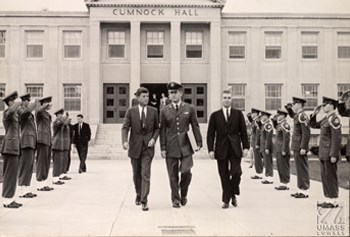
11/19/2013
By Jill Gambon
The world irrevocably changed on Nov. 22, 1963, with the assassination of President John F. Kennedy. In an unthinkable instant, an era of optimism and seemingly limitless possibilities went dark.
Nowhere was Kennedy’s death grieved more deeply than his home state of Massachusetts.
At UMass Lowell, the Kennedy family forged a bond that is deep and enduring. In September 1945, Joseph P. Kennedy Sr. gave a scholarship to Lowell Textile Institute for graduate research in memory of his oldest son, Joseph, a U.S. Navy pilot killed in World War ll. Eleven years later, then-Sen. John F. Kennedy came to campus to receive an honorary Doctor of Science in recognition of his public service and leadership.
In the following years, the Kennedys returned to Lowell to campaign, stirring excitement that is captured in (https://web.uml.edu/gallery/index.php/University_Relations/Kennedys-in-Lowell) photos from the Poirier Collection at the University’s Center for Lowell History.
UMass Lowell commemorated the 50th anniversary of Kennedy's death with a concert that celebrated his life and legacy on Nov. 22 in Durgin Concert Hall. The UMass Lowell orchestra and choirs performed with narration by Sen. Eileen Donoghue.
In observance of the anniversary of Kennedy’s assassination, members of UMass Lowell’s community paused to reflect on their memories of that Friday in November and to share their perspective on the impact of the Kennedy family legacy.
Chancellor Marty Meehan:
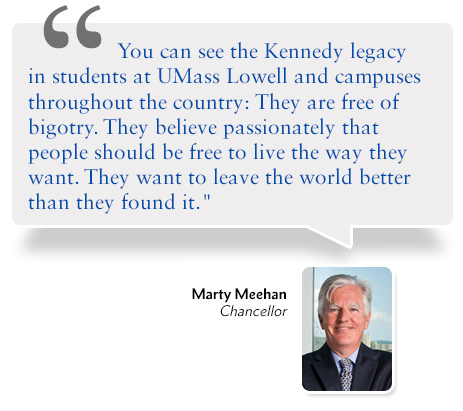
“Growing up in an Irish-Catholic Massachusetts Democratic household, President Kennedy meant a lot to my family. His assassination was a formative experience – I remember it all clearly. I was in second grade and that weekend, everyone was glued to the television. Everyone was numb. It took a while for the magnitude of the tragedy to sink in.
"You can see the Kennedy legacy in students at UMass Lowell and campuses throughout the country: They are free of bigotry. They believe passionately that people should be free to live the way they want. They want to leave the world better than they found it. In continuing that legacy, our job as a University is to give young people the tools they need to fulfill their potential. Part of our responsibility is getting them to understand they can dream big and have an impact on the world. That’s why we have programs like DifferenceMakers, service learning and assistive technology in engineering.”
Visit the Chancellor’s Facebook page for more on his reflections on the Kennedys.
Nancy L. Donahue, 2013 Honorary Degree recipient and longtime University supporter, whose husband, attorney Richard Donahue (honorary degree, 1991), was a Kennedy aide:
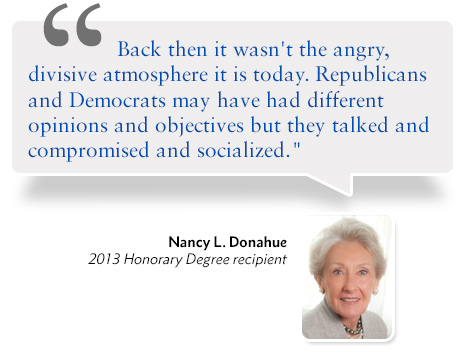
“We both started campaigning for JFK back in the '50s when he was running for Congress and then when he ran for Senate against Henry Cabot Lodge. When JFK was elected president, he asked Dick to be on his staff in the White House. We then moved to Washington D.C. for the next three years. There was a lot of positive energy and many bright minds working to make things better. Dick decided it was time to come back to Lowell and take up his law practice once again. His resignation date was November 15, 1963. We had a lovely going away party on the Potomac on the President’s boat and then just one week later he was shot. Of course, we flew back to Washington for the funeral. It was tragic for the whole world.
"We have many happy memories of our time there. Back then it wasn't the angry, divisive atmosphere it is today. Republicans and Democrats may have had different opinions and objectives but they talked and compromised and socialized.”
Donald LaTorre, ’59, Textile Chemistry, '07 Honorary Degree:
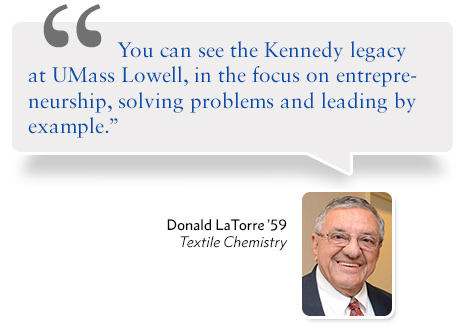
“I was a student when Senator Kennedy visited campus. It was a big deal, the interest in him was high. When he died, it was so tragic. As a country, we had never experienced a national tragedy broadcast on television. Kennedy was the youngest president ever but he had a real vision for the country. Kennedy’s vision was all about how each individual can do whatever he or she chooses to do. You can see the Kennedy legacy at UMass Lowell, in the focus on entrepreneurship, solving problems and leading by example.”
Ralph Jordan, Lecturer, Manning School of Business:
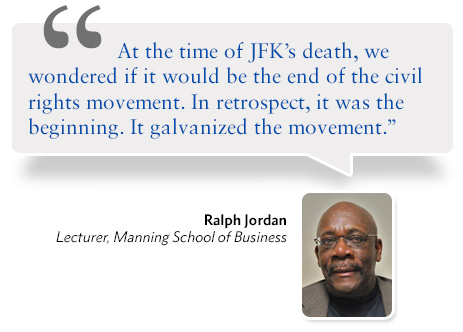
“I was a junior in high school when President Kennedy was killed. We were in school and the principal made the announcement over the loudspeaker. It was stunning.
"I am a product of the civil rights movement and JFK represented hope. He was on our side. His death was a real blow. At the time of President Kennedy’s death, we wondered if it would be the end of the civil rights movement, when in retrospect it was the beginning. It galvanized the movement. A lot of people on the sidelines got engaged. We’d come too far to let that set us back.”
Frank Talty, Assistant Dean, College of Fine Arts, Humanities and Social Sciences:
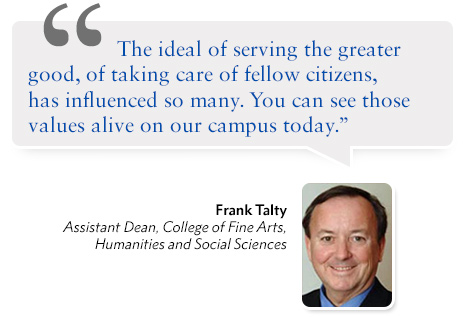
“Rose Kennedy instilled in her family the idea that public service was a noble profession. John, Robert and Ted Kennedy were inspired by that and believed that one person can make a difference. The ideal of serving the greater good, of taking care of fellow citizens, has influenced so many. You can see those values alive on our campus today.”
"The Kennedy presidency still provides lessons for us. I have a student this semester doing a directed study on the Cuban Missile Crisis; he wanted to learn more about John F. Kennedy. The issues from that era are some of the same that we continue to face as a society.”
Prof. Aldo Crugnola, Dean Emeritus of the Francis College of Engineering:
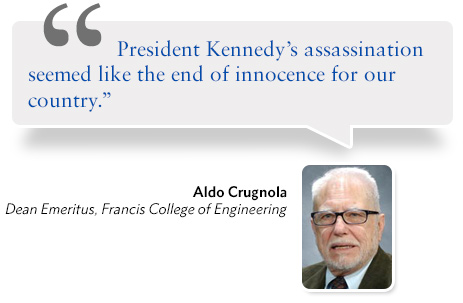
“President Kennedy’s assassination seemed like the end of innocence for our country. I was living in Italy from 1962 to 1968 and when I left, the feeling with my generation was ‘my country right or wrong.’ When I returned, things were so different, there was so much turmoil. I didn't think I’d come back to the same country.”
Sarah McAdams Corbett provided additional reporting for this story.
